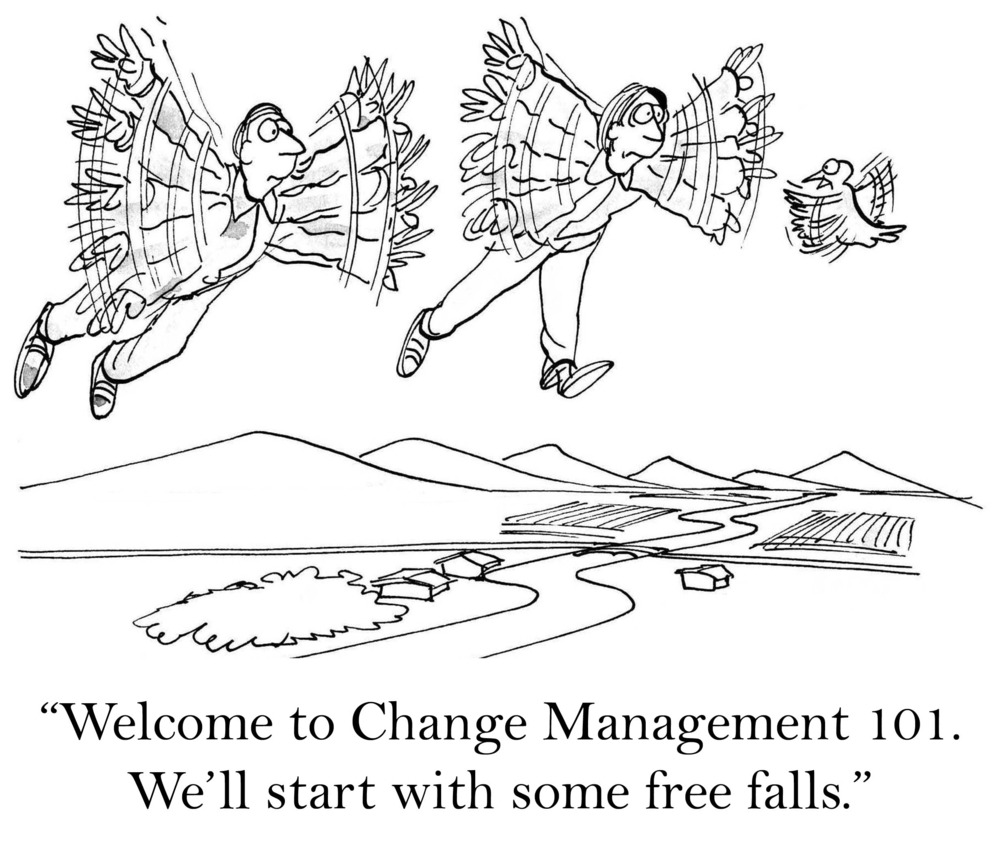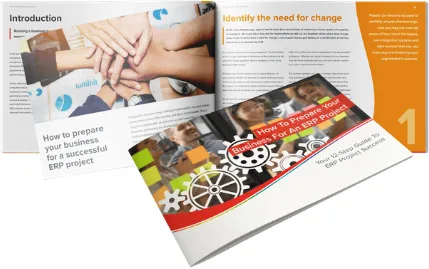The deadline for aged care organisations to submit their first Quarterly Financial Report is fast approaching, and, if your organisation has chosen to manually collect the required information from multiple departments and meet the stringent reporting and record keeping obligations, you potentially have as many as 4 weeks of work ahead of you. There is however, a silver lining. You will also be collecting a swathe of information that will help you build a business case for investing in business improvement measures, or an ERP system.
Change Management in ERP Projects
7 Reasons Good Change Management is Crucial for ERP Projects
Change is good. Change is what makes sure your business stays ahead of the curve and stays lean, mean and fighting fit in an evolving market. But change can also be scary.
If you are planning to put an enterprise resource planning (ERP) solution in place at your organisation, you need to be prepared for some big changes, and these changes will need to be managed appropriately within the business to ensure a positive outcome.
The last thing you need is for your implementation to be derailed because you didn’t manage change effectively. Read on to learn more about how a proactive approach to change management can make all the difference when it comes to supporting your business with ERP.

1. Team members need support as their roles shift
It is likely that your team members will undergo quite a bit of turmoil during the ERP implementation. While the business solution will certainly make their working lives easier in the long run, your personnel still need to get used to a new way of working in the short term, and this is not always easy.
Your team may not have experienced a role shift like this in quite some time. Perhaps they’ve never experienced it. If you are going to keep everyone on board and make sure that morale stays high, you need to carefully manage this transition.
This means close support. Don’t let anyone feel left out during the implementation process. Instead, work with each and every member of your team to make sure everyone’s needs are met during the process.
2. Budget allocation needs to be managed
It is not just the roles of team members that are going to enter a state of flux and transition during implementation (although this is certainly a major concern too). Your budget is going to shift too.
Of course, you will need to budget for the technical aspects of the implementation process. During the planning phase, these technical aspects will be relatively easy to identify and to prepare for. However, this only represents one side of the story.
There are other aspects to be planned for, including many of the indirect costs that may arise during the project. Indirect costs may include:
• Training and education costs
• Planning and development of new operation processes
• Communication and support costs – particularly if you decide to outsource change management to a professional.
Budget allocation planning needs to be carefully executed. Set this task for your change management leader or team to make sure that these elements of the process are properly budgeted for.
3. ERP projects do not exist in isolation
It would be great if you could just assign an implementation team the task of rolling out your ERP solution while everyone else gets on with their normal tasks without disruption. This might sound like an ideal situation, but it is not a realistic one. The implementation of your ERP solution is not an isolated event — instead, it is connected to all of the operational processes within your team.
Immediately, this becomes problematic. Isolated projects, overseen and handled by one team, are easy to manage. Global projects, which impact every team and every process, are not so easy to manage, and need to be handled very carefully.
A change management coordinator or team works to minimise disruption during the transition process, as well as managing the expectations of teams during the roll-out. The result is a cohesive experience that is geared towards a smooth transition.
4. All team members need to be engaged in the ERP project
Not everyone likes change. Or, more accurately, we cannot predict if team members will embrace a particular change or be wary of it. This is another reason why change management is so important. For successful ERP implementation, everyone needs to be on board. And that really does mean everyone throughout the duration of the project, whether they are directly involved in the project or not.
A good way to begin is with an impact statement that demonstrates to each and every member of staff what is going to happen, what difficulties can be expected, and why the implementation plan is so worth it.
Follow this up with long-term support for team members – have your change management leader guide teams through the specific changes they face as part of the broader project. This keeps morale high and ensures that every member of your team gets on board with the implementation — and stays there.
5. Key metrics will need to be measured to identify success
It’s no secret that an ERP project requires a significant financial investment. This investment will be needed to roll out ERP software across the business’s systems, as well as to provide training and support to the members of staff who will be using these solutions.
Of course, as with any investment, there needs to be a way to manage the return.
Good change management can facilitate better analysis and assessment of the appropriate metrics to identify success. What’s more, without managing the change, the implementation can experience roadblocks, and the process may become slow and cumbersome, resulting in a slower path to success and slower returns on the initial investment.
6. Failures and missteps during implementation need to become learning opportunities
Even with the best planning and implementation, things can go wrong with any project. Of course, such failures and missteps can be dispiriting and frustrating, but they are also great opportunities to learn about what can be improved and about how to target better results as you move forwards with the project.
The problem is, it is a natural human reaction to become dejected when things don’t go according to plan — even small things. This is where effective change management comes into play, as change management teams can help to foster a culture of resilience and focus.
Once the proper insight and understanding has been shared, your team members will likely view the setback in a far different light and will be better equipped to move on with the project in a positive way. With a strong change management individual or team helping to control the narrative and keep people focused on what is important, the ERP solution can be implemented far more effectively.
7. Change management helps your business power through and achieve great results
All of the above needs to take place behind the scenes while your business keeps on running at as close to full capacity as possible. You can’t afford to take a few weeks off to roll out a new business software solution, nor do you need to do so. Effective change management should keep the project on course and minimise the disruption faced by the rest of your business.
Keep your customers happy, keep your team happy, and keep your business moving on towards bigger and better things — that really is the aim of the game during ERP implementation.
Putting an effective ERP implementation program in place and securing full-service availability for your customers throughout, is a daunting task, but it’s not an impossible one.
Change management is going to be vital as you negotiate a smooth transition from old inefficiencies to a new and far more effective way of doing things.
Read more about how to identify the need for change and consider the change management factors relevant to your business in our free downloadable 12 Step Guide to ERP Project Success.
Related Articles
Navigate Aged Care Reform With ERP
The aged care provider industry is experiencing a raft of changes across five distinct pillars – home care, residential aged care services and sustainability, residential aged care quality and safety, workforce, and governance. The reforms have the potential to be disruptive to your business, which may be disastrous in an increasingly competitive environment. Reviewing and upgrading your business management (ERP solution) may be the answer.
Epicor ERP Renamed Kinetic
An innovative modern interface is just one of the many improvements Epicor has made to enhance ERP user experience with its rebranded ERP system Epicor Kinetic. Kinetic aligns with the needs of manufacturers by providing ‘anywhere’ ‘anytime’ data access, AI, and built-in collaboration tools.
Epicor ERP 10.2.700 Released
The ability to cost and forecast is a key component to success and an exciting ‘game-changing’ feature of Epicor ERP 10.2.700. With this feature and more in the latest update, Epicor continues to invest in next generation technology to deliver the tools and ERP capability our customers need to drive their business forward.
Epicor SLS 10.2.600 Released
With a focus on CRM, community care and project management, the release of the latest enhancements to the Epicor ERP Senior Living Solution, will substantially support Australian aged and home care and independent living providers to be more efficient and productive.
Trends in Information Management
A survey of businesses by Epicor showed a surprising number of CFOs relied on instinct for decision-making. The reason? Distrust in a company’s financial data accuracy due to inadequate IT systems that can ultimately leave a business floundering in delays, errors, cash flow problems and lower profits.

